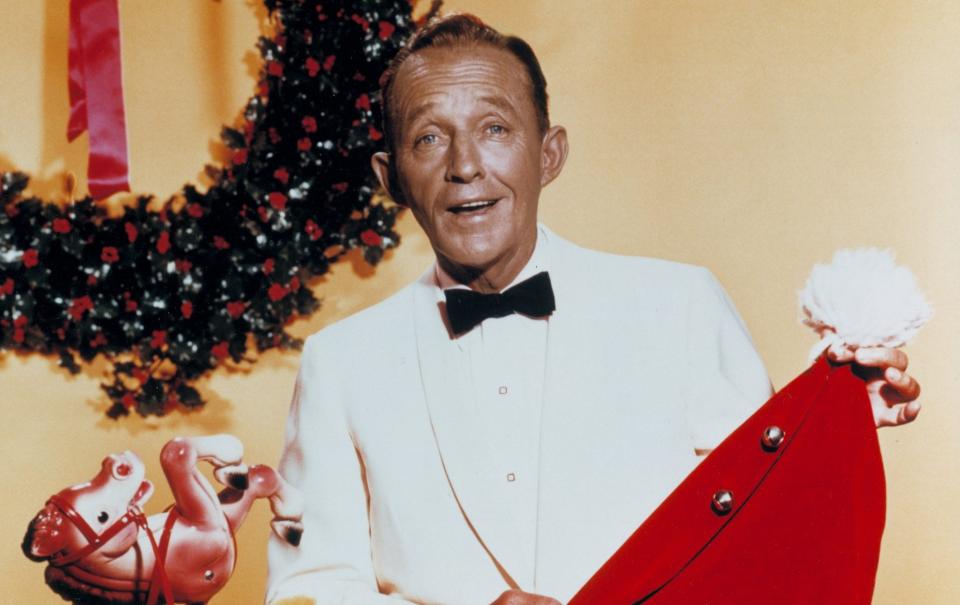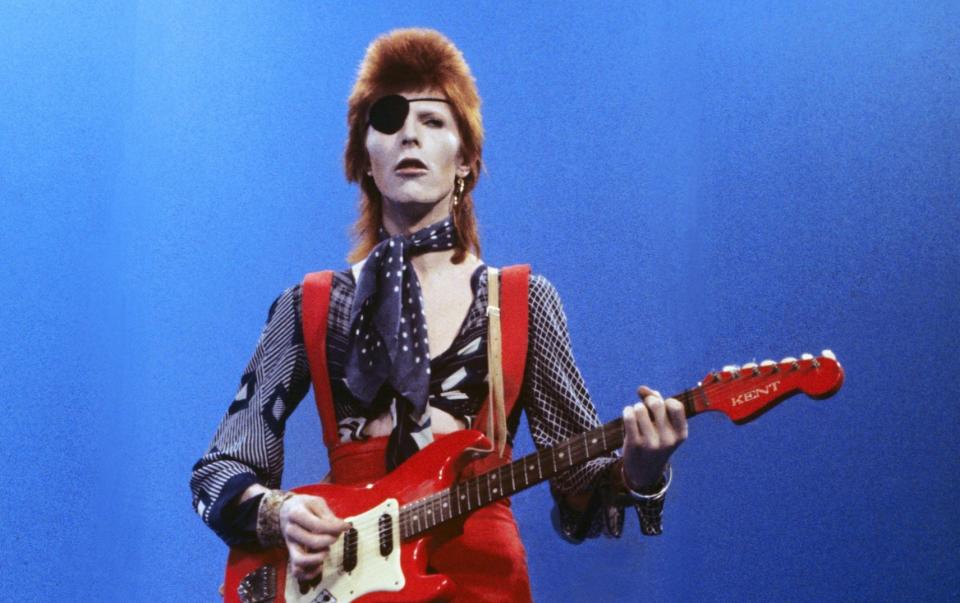When Bowie met Bing Crosby: how Little Drummer Boy became a hit

In 1977, few would have put Bing Crosby and David Bowie in the same room. Crosby, 74, was an old-school entertainer, a man famous for dreaming of a white Christmas. Bowie, meanwhile, had spent so long living on a diet of milk and cocaine that he couldn’t remember making Station to Station the year before. And yet, somehow, this odd couple wound up recording one of the best-loved – and most unlikely – Christmas songs ever made.
Even after five decades in showbusiness, Crosby wasn’t yet ready to quit. He’d spent the past 20 years redefining himself as a broadcast personality. It was a move that slightly smacked of desperation: in the Fifties, he’d dismissed the small screen. “Nothing but the gravest emergency will drive me into television,” he claimed. “As far as me or anyone in my position is concerned, we should only be doing it if we really need work.”
But he did really need the work. Crosby was constantly having run-ins with the taxman, often forcing him to sell property to cover his IRS bills. During the Sixties he embraced television with a run of specials that saw him duet with stars including Ella Fitzgerald, Frank Sinatra and Dean Martin. From 1955, these specials took a festive turn, as his annual radio show A Christmas Sing with Bing appeared on the small screen. After 22 years, they had become a tradition.
Bing Crosby’s Merrie Olde Christmas may have been a schmaltz-fest, but it was an undeniably good platform – and Bowie wanted part of it. The former Thin White Duke had been living in Berlin for the past year, shrugging off his addiction in tandem with his flatmate Iggy Pop. He would emerge from his German retreat with three albums, the second of which was 1977’s Heroes.
The record was due out in mid-October, just after its titular lead single. More than 40 years on, with Heroes deemed a classic worthy of Olympic Opening Ceremonies and 9/11 tribute concerts, it’s difficult to imagine Bowie needing to do the promo rounds for it. But he did – namely, in a prime slot on Bing Crosby’s Christmas show. What’s more, Bowie could only get that slot if he agreed to duet with Crosby. The fact that Bowie’s mother was a huge fan of the old crooner helped to sweeten the deal.
We’ll never be sure whether or not Crosby – again, at the age of 74 – was really aware of who Bowie was. Buz Kohan, who wrote the special, suspected not, although Ian Fraser, one of the show’s musical co-writers, thought otherwise. “I’m pretty sure he did”, he told the Washington Post in 2006. “Bing was no idiot. If he didn’t, his kids sure did.”
And the Crosby kids were as integral a part of those Christmas specials as the man himself. Since the beginning, Crosby had been fond of including his family in the annual events, and no exception was made for the 1977 episode – much to the exasperation of his then-teenage children. “Oh my goodness, I was not happy in the Christmas Shows,” recalled Nathaniel Crosby, who had been 15 at the time, in a 2014 documentary. “I was trying very hard not to be animated or smile or show any enthusiasm or spirit, for fear that I was going to be razzed at school.”
His daughter, Mary, was similarly unimpressed: “If you look at it retrospectively you think, ‘Oh my God, this is not great art. This isn’t even decent music. This is just someone who is fantastic who wants to share his family.’ I think my brother was the only one with talent – Harry, he could play guitar and piano. The rest of us were just staggering around and singing badly.”
But the teenage children were starstruck by Bowie, who made quite an entrance. “The doors opened and David walked in with his wife,” Mary remembered. “They were both wearing full-length mink coats, they had matching full makeup and their hair was bright red. We were thinking, ‘Oh my God.’”
“It almost didn’t happen,” Nathaniel added. “I think the producers told him to take the lipstick off and take the earring out. It was just incredible to see the contrast.”

It wasn’t just the blue suit that nearly put the kibosh on the duet. Although Bowie explained in the song’s scripted preamble that Little Drummer Boy was the favourite of six-year-old Zowie (later Duncan) Bowie, the 30-year-old father despised it.
“David came in and said: ‘I hate this song. Is there something else I could sing?’” Fraser said. “We didn’t know quite what to do. When we told Bowie about the number, he said, ‘I won’t sing that song. And if I have to do that song, I can’t do the show.’”
Bowie was on the cusp of taking his full-length mink back out of the door when Kohan, Fraser and Larry Grossman, another of the show’s writers, hatched a plan. “We decided the best way to salvage the arrangement was to do a counter-melody that would fit in within the spaces, and maybe write a new bridge, and see if we could sell him on that. It all happened rather rapidly: I would say within an hour we had written it and were able to present it to him again.”
Crosby and Bowie rehearsed for less than an hour before Little Drummer Boy was recorded. “They sat at the piano and David was a little nervous,” Mary remembered. “Dad realised that David was this amazing musician, and David realised that Dad was an amazing musician. You could see them both collectively relax, and then magic was made.”
After the recording, Crosby would call Bowie a “clean-cut kid and a real fine asset to the show”. “He sings well,” he added, “has a great voice, and reads lines well”.

Nearly 50 years later, the duet remains a slice of yearning beauty, Bowie’s hopes for “peace on Earth” gently keening against Bing’s bassline. It was surrounded, of course, by 50 minutes of pure Seventies cheese. The special was filmed in London, where Crosby was touring his 50th anniversary show.
Crosby opens his Californian door to a spiffing messenger who works for a distant British relative, Sir Percival Crosby (played by Ron Moody), who has invited the singer to his estate. The whole Crosby clan then descends upon a snowy London castle (!) for Christmas to sing their way through encounters with charmingly recalcitrant staff (played by Stanley Baxter in drag) and the ghost of Charles Dickens (Ron Moody). As a prelude to Bowie’s spectral rendition of Heroes, Twiggy and Crosby sing Have Yourself a Merry Little Christmas in a spooky attic.
The special was a success when it aired in the UK on Christmas Eve 1977, a delivery of festive American glamour with the greatest pop star of the era. As far as the television producers were concerned, Peace on Earth/Little Drummer Boy had done its job. “We never expected to hear about it again,” Kohan said of the hastily assembled duet.
Bowie’s record label, however, had different plans. Although the song was available as a bootleg, RCA Records – with whom Bowie’s relationship was ailing – released the Christmas song as an official single in November 1982. More bizarrely, they B-sided it with Fantastic Voyage, an album track from Bowie’s 1979 album Lodger. It proved the final straw for Bowie, who left RCA for a $17.5 million contract with EMI the year after.
But while they lost Bowie, RCA were vindicated by the release: the single, which included a recording of Crosby and Bowie’s stilted chat, became one of the singer’s fastest-selling hits, shifting 250,000 copies in a month and reaching number three in the charts. (It missed out on Christmas number one thanks to Shakin’ Stevens and Renee and Renato’s Save Your Love.)
While the rest of Bing Crosby’s Merrie Olde Christmas has faded from pop consciousness – and probably with good reason, although every festive minute can be found on YouTube – Bing and Bowie’s duet became a staple of seasonal nostalgia. Today, it’s rendered all the more endearing by the novelty of seeing Ziggy Stardust dress down for Christmas with Bing.
Sadly, it would be Crosby’s last. Bing Crosby’s Merrie Olde Christmas was the veteran singer’s final television recording: he died from a massive heart attack just six weeks later, induced by a “great game of golf”. On the same day, Bowie’s Heroes was released. It began a new era in the young star’s career.

 Yahoo News
Yahoo News 
